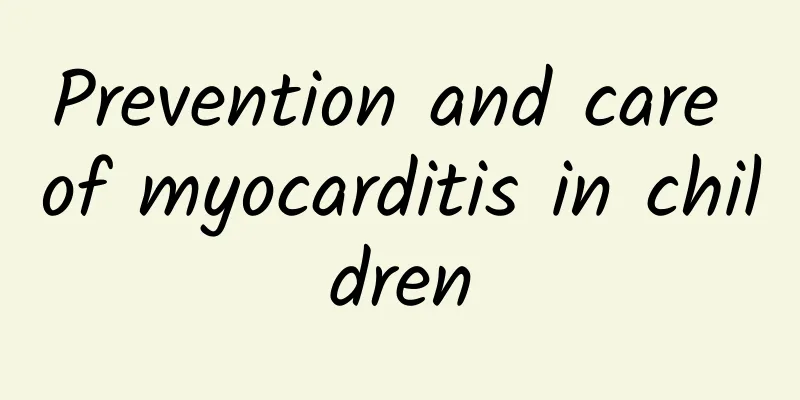Prevention and care of myocarditis in children

|
Myocarditis is a common heart disease, especially among children and adolescents. In severe cases, it may endanger the life of the child. For children, timely treatment and good prevention and care are crucial. So, how to prevent and care for pediatric myocarditis? 1. Common causes of myocarditis in children Viral Infections: Adenovirus: serotypes 2 and 5. Enterovirus: Coxsackievirus A and B, echovirus, poliovirus, among which coxsackievirus B (CVB) is the most common. Other viruses: herpes simplex virus, varicella and shingles virus, rubella virus, mumps virus, etc. 2. Symptoms of Myocarditis in Children Children with pediatric myocarditis often present with a range of symptoms, including but not limited to the following: 1. Difficulty breathing or shortness of breath: Myocarditis can cause weakened heart function, which in turn reduces the heart's pumping function and obstructs blood circulation, thus causing the body to lack oxygen, which manifests as difficulty breathing or shortness of breath. 2. Palpitations or irregular heartbeat: When the myocardium is damaged, the heart rhythm may be affected, resulting in inconsistent, irregular heartbeats or palpitations. 3. Chest pain or discomfort: The inflammatory response and myocardial damage caused by myocarditis may cause chest discomfort or pressure, or even symptoms of chest pain. 4. Fatigue and decreased physical strength: Myocardial damage will affect the normal function of the heart, causing children to feel tired, weak, and have decreased physical strength, and even have difficulty in daily activities. 5. Cough: Sometimes myocarditis in children is accompanied by cough, which may be caused by pulmonary edema or inflammation due to heart failure. 6. Fever: Due to the immune system's response and inflammatory reaction, children with myocarditis may experience fever. 7. Loss of appetite: Children with myocarditis may experience a loss of appetite, possibly because they are weak or feeling unwell. 8. Nausea or vomiting: Among the symptoms caused by myocarditis, children may sometimes also experience digestive system problems such as nausea or vomiting. 9. Dizziness or syncope: Myocarditis may cause impaired cardiac circulation and insufficient blood supply, resulting in symptoms of dizziness, vertigo or syncope. These symptoms may vary from person to person and may vary in severity. If parents or guardians notice any of the above symptoms in their children, especially if multiple symptoms occur at the same time or persist, they should seek medical help immediately. 3. Preventive measures for myocarditis in children 1. Enhance children's resistance, improve physical fitness, encourage children to participate in more outdoor activities, enhance their ability to resist cold, and prevent sudden changes in temperature from causing a decrease in immunity and susceptibility to viral infections. 2. During the influenza season, avoid taking children to public places, keep a distance from people with colds or fevers, and isolate them if necessary until the infectious period is over to reduce the risk of infection in children. 3. When the weather suddenly turns cold, add clothes to your child in time to prevent him from catching cold and reduce the possibility of respiratory and intestinal infections. 4. During the epidemic of viral diarrhea in children, avoid going to public places to prevent gastrointestinal viral infection and avoid transmitting it to children. 5. If a child is infected with a virus, he or she should get enough rest, drink plenty of water, and eat a high-protein, high-fat, high-vitamin diet to enhance the child's disease resistance. 4. Nursing measures for pediatric myocarditis 1. Medical monitoring: After being diagnosed with pediatric myocarditis, the child's symptoms and changes in condition need to be closely monitored. According to the doctor's arrangements and suggestions, take the child to the hospital for follow-up visits regularly. Parents should closely observe changes in the child's symptoms and observe whether the child has difficulty breathing, chest pain, palpitations, sweating and other discomforts. 2. Rest and control activities: Pay attention to rest. Children in the acute phase and with heart failure should pay attention to absolute bed rest, which will help reduce the burden on the heart. 3. Medication: Doctors may prescribe medications, such as antiviral drugs, anti-inflammatory drugs, or diuretics, to control inflammation, relieve symptoms, and promote recovery of heart function. Parents should strictly follow the doctor's instructions, give their children medications accurately and on time, and closely observe for any side effects of the drugs. If you have any questions or discomfort, you should consult a doctor in time. 4. Diet management: Provide a healthy and balanced diet to maintain the child's nutritional needs, which will help with physical recovery and immunity. Ensure that the child consumes a balanced and diverse nutritious food, including fresh fruits, vegetables, whole grains, healthy protein sources (such as fish, chicken, beans, etc.) and healthy fats (such as nuts, olive oil). Control the child's salt and sugar intake to reduce the burden on the heart, and encourage the child to drink plenty of water to maintain a good water balance. 5. Psychological support: Psychological support is essential for children with pediatric myocarditis and their parents. Facing the challenges of the disease may bring anxiety and stress to parents or children, so mutual support and understanding between family members and medical staff are needed. 6. Avoid infection: Children with pediatric myocarditis may have a compromised immune system, so they need to avoid contact with infected people or disease-spreading environments to reduce the risk of secondary infection. In short, the prevention and care of pediatric myocarditis is a comprehensive process that requires the joint efforts of parents and doctors. Paying attention to children's health, enhancing immunity, regular physical examinations and timely medical treatment are the key to preventing pediatric myocarditis. For children who have already suffered from pediatric myocarditis, providing comprehensive care and support will help promote the recovery of children and improve their quality of life. Finally, I hope that every child can grow up healthily and stay away from the troubles of diseases. (Hu Dongyan, Lingshou County People's Hospital, Shijiazhuang City, Hebei Province) |
<<: Nursing measures for patients with cholecystitis
>>: 2023 "Pharmacy Popular Science Works" Essay Exhibition | Side effects ≠ bad effects
Recommend
Why do frogs croak at night? Why do frogs in different places have different colors?
Why do frogs croak at night? When walking in the ...
Can Lancome Aurora Water be used on sensitive skin? What skin and age is Lancome Aurora Water suitable for?
Lancome Aurora Water is for combination skin and ...
Tight stomach in late pregnancy
The tightening of the abdomen in the late pregnan...
What are the contents of the 32nd week of pregnancy check-up?
During pregnancy, there will always be some prena...
What happens if there is a blister on my labia?
The female labia is an extremely private part. In...
If you want to stay away from uremia, don’t take these 6 kidney disease misunderstandings seriously!
Uremia is the outcome that many kidney disease pa...
18 weeks pregnant belly hard and tight
After pregnancy, the body of a pregnant woman wil...
Messi hasn't drunk soda or eaten pizza for 8 years. What should athletes pay attention to in their diet?
China Science and Technology News Network, Novemb...
What are the reasons why women age easily?
The aging of the body is inevitable, but if you c...
What to do if pregnant women have dermatitis and eczema
Pregnant women should not take any medicines as i...
Three major reasons for delayed menstruation and leucorrhea
Many women often suffer from physical illnesses d...
Can ectopic pregnancy be detected with test strips?
Nowadays, the number of ectopic pregnancies is co...
Causes of watery and fishy vaginal discharge
Many women have this problem: leucorrhea that is ...
What should I do if I don't do well in the confinement period?
The short confinement period is what we often cal...
The difference between false condyloma acuminatum and real condyloma acuminatum in women
The symptoms of false genital warts and real geni...









